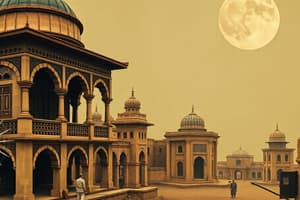Podcast
Questions and Answers
প্রোফেট মুহাম্মাদের জীবনে কবে তিনি আল্লাহর প্রথম ওহী প্রাপ্ত করেন?
প্রোফেট মুহাম্মাদের জীবনে কবে তিনি আল্লাহর প্রথম ওহী প্রাপ্ত করেন?
৪০ বছর বয়সে
ইসলামিক স্বর্ণযুগের সময় কবে?
ইসলামিক স্বর্ণযুগের সময় কবে?
৮ম-১৩শ শতাব্দী
খলিফা ব্যবস্থার মূল বৈশিষ্ট্য কী?
খলিফা ব্যবস্থার মূল বৈশিষ্ট্য কী?
খলিফার নেতৃত্ব, সফলতা ও শাসন ব্যবস্থা
উসমানীয় সাম্রাজ্যের সময় কবে?
উসমানীয় সাম্রাজ্যের সময় কবে?
প্রোফেট মুহাম্মাদের জীবনে তার ফুফু আবু তালিব কী করেছিলেন?
প্রোফেট মুহাম্মাদের জীবনে তার ফুফু আবু তালিব কী করেছিলেন?
সুফিবাদের মূল নীতি কী?
সুফিবাদের মূল নীতি কী?
ইসলামিক স্বর্ণযুগে কী ধরনের অর্জন হয়?
ইসলামিক স্বর্ণযুগে কী ধরনের অর্জন হয়?
উসমানীয় সাম্রাজ্যের সাহিত্য ও স্থাপত্যের বৈশিষ্ট্য কী?
উসমানীয় সাম্রাজ্যের সাহিত্য ও স্থাপত্যের বৈশিষ্ট্য কী?
খলিফা ব্যবস্থার মধ্যে কোন খলিফাটি সবচেয়ে সাধারণভাবে সমাদৃত?
খলিফা ব্যবস্থার মধ্যে কোন খলিফাটি সবচেয়ে সাধারণভাবে সমাদৃত?
সুফিবাদের কী ধরনের পথ আছে?
সুফিবাদের কী ধরনের পথ আছে?
উসমানীয় সাম্রাজ্যের সময় কী ধরনের বিনিময় হয়?
উসমানীয় সাম্রাজ্যের সময় কী ধরনের বিনিময় হয়?
সুফিবাদে কী ধরনের সাধনা হয়?
সুফিবাদে কী ধরনের সাধনা হয়?
Flashcards are hidden until you start studying
Study Notes
Prophet Muhammad's Life
- Born in Mecca, Arabia in 570 CE
- Orphaned at a young age and raised by his uncle Abu Talib
- Received first revelation from Allah through Angel Gabriel at 40 years old
- Began preaching Islam, initially facing opposition from the Meccan tribes
- Emigrated to Medina in 622 CE, marking the beginning of the Islamic calendar
- Unified Arabian Peninsula under Islam and established a Muslim state
- Died in 632 CE, succeeded by the first caliph, Abu Bakr
Islamic Golden Age
- Period of significant cultural, scientific, and philosophical achievements (8th-13th centuries)
- Major centers of learning and intellectual inquiry: Baghdad, Cairo, and Córdoba
- Significant contributions:
- Mathematics: development of algebra and Arabic numerals
- Astronomy: accurate astronomical tables and discovery of new stars
- Medicine: establishment of hospitals and medical schools
- Philosophy: integration of Greek philosophy with Islamic theology
Sufism And Mysticism
- Sufism: a mystical tradition within Islam, focusing on inner purification and spiritual growth
- Key principles:
- Love and devotion to Allah
- Renunciation of worldly desires
- Spiritual poverty and humility
- Notable Sufi thinkers:
- Rumi (1207-1273 CE): poet and philosopher, founder of the Mevlevi Order
- Ibn Arabi (1165-1240 CE): Andalusian mystic and philosopher
Caliphate System
- A system of governance in which a caliph (leader) is the successor to the Prophet Muhammad
- Key features:
- Leadership: the caliph is the spiritual and temporal leader of the Muslim community
- Succession: the caliph is elected or appointed by a council of leaders
- Governance: the caliph is responsible for upholding Islamic law and maintaining social order
- Notable caliphates:
- Rashidun Caliphate (632-661 CE): the first four caliphs, considered the "rightly guided" caliphs
- Umayyad Caliphate (661-750 CE): established in Damascus, known for its administrative and architectural achievements
- Abbasid Caliphate (750-1258 CE): established in Baghdad, marked the Islamic Golden Age
Ottoman Empire
- One of the largest and longest-lasting empires in history (1299-1922 CE)
- Key features:
- Expansion: conquered vast territories in Europe, Asia, and Africa
- Administrative system: divided into provinces governed by governors and viziers
- Cultural achievements:
- Architecture: development of Ottoman architecture, blending Byzantine and Islamic styles
- Literature: flourishing of Turkish literature, including poetry and historiography
- Notable Ottoman rulers:
- Osman I (1258-1326 CE): founder of the Ottoman Empire
- Suleiman the Magnificent (1520-1566 CE): expanded the empire's borders and reformed the administrative system
Studying That Suits You
Use AI to generate personalized quizzes and flashcards to suit your learning preferences.



